Sun Tzu was a Chinese military general, strategist, philosopher and author. Sun Tzu is traditionally considered the author of The Art of War, an influential work on military strategy that influenced Western and East Asian philosophy and military thought.
Sun Tzu is revered in Chinese and East Asian cultures as a legendary historical and military figure. His real name is Sun Wu (Traditional Chinese: 孫武; Simplified Chinese:孙武; Pinyin:Sūn Wǔ ), and his courtesy name is Changqing (Chinese: 长卿). The name Sun Tzu by which he is more popularly known is an honorific which means “Master Sun“.
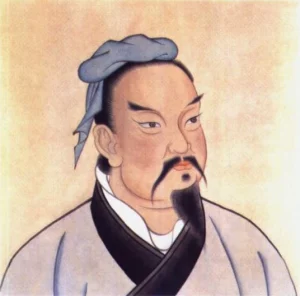
| full name | Sun Wu (Chinese: 孙武 Pinyin: Sūn Wǔ) |
| courtesy name | Changqing |
| Born | About 545 BCE |
| Died | About 470 BCE |
| Birthplace | A native of Qi State in the late Spring and Autumn Period of China |
| Sun Tzu’s works | The Art of War |
Sun Tzu’s Family Background
Sun Tzu was born in Le’an, Qi State (today’s Huimin, Shandong Province) around 545 BC. The specific dates of birth and death are unknown.
Sun Wu’s ancestor was canonized as the King of Chen State by the Emperor of Zhou Dynasty. Later, due to an internal coup in Chen State, Sun Wu’s direct distant ancestor Gui Wan fled to Qi State with his family and defected to Duke Huan of Qi (the ruler of Qi State). Duke Huan of Qi had long known that Gui Wan was young and promising, and appointed him as the Gong Zheng responsible for managing all the affairs. After Gui Wan settled in Qi State, his surname was changed from Gui to Tian, so he was also called Tian Wan.
More than a hundred years later, the Tian family has become a large rising family in Qi State. Its status has become more and more prominent, and its territory in Qi State has also expanded.
Tian Wan’s fifth-generation grandson, Tian Shu, became a high official in Qi State and was very talented in military affairs. Because of his merits in leading the army to attack Ju, Qi Jinggong gave him the surname Sun. Therefore, Tian Shu is also called Sun Shu. Sun Ping, the son of Sun Shu, became a minister of the State of Qi and became the highest-ranking official below the monarch of the State of Qi. Sun Ping is Sun Wu’s(Sun Tzu‘s) father.
From this we learn that Sun Wu was born into a noble family and had a very privileged family background. His father was an official second only to the monarch of Qi.
Familiarize oneself with books on war
Because the aristocratic family provided Sun Wu with a superior learning environment, Sun Wu was able to read the ancient military classic “Military Administration” and learn about the Yellow Emperor’s combat experience in defeating the four emperors and the military history of Yi Yin, Jiang Taigong, and Guan Zhong. In addition, wars were frequent and mergers were fierce at that time, his grandfather and father were both generals who were good at leading troops in battles. He had heard and witnessed some wars since he was a child, which was very important for the military training of young Sun Wu.
Sun Tzu’s military talent was slowly cultivated since he was a child.
Sun Tzu left Qi State and went to Wu State
However, the Qi State where Sun Wu lived was full of internal conflicts and crises. Later, the conflict between the Qi government and the four major families (Tian, Bao, Luan, and Gao), and the struggle for power and profit between the four major families, became more and more intense. Sun Wu was extremely disgusted with this kind of internal struggle and did not want to get involved in it. He had the idea of running away from home and finding another way to display his talents.
At that time, the Wu State in the south had joined forces with the Jin State to conquer Chu State since Shou Meng became king. The country was strong and prosperous. Sun Wu determined that Wu was the ideal place for him to display his talents and realize his ambitions. Around the 31st year of Qi Jinggong (517 BC), the 28-year-old Sun Wu resolutely left Qi State, traveled a long distance, and defected to Wu State. Sun Wu’s career began in the State of Wu, and he was buried in the State of Wu after his death. Therefore, “Spring and Autumn Annals of Wu and Yue” calls Sun Wu a native of the State of Wu.
For various reasons, the 28-year-old grandson left Qi and came to Wu, where he spent the rest of his life.
Wrote down Sun Tzu’s Art of War
After arriving in the State of Wu, Sun Tzu lived in seclusion in GuSu (now Suzhou, Jiangsu Province), the capital of the State of Wu, and concentrated on studying the art of war. Due to the struggle situation in the Spring and Autumn Period, as well as the actual combat experience of Sun Tzu’s ancestors, as well as Sun Wu’s personal talents and interests, Sun Wu conducted in-depth research on the wars, strategies and tactics of the time during his seclusion period. “Sun Tzu’s Art of War” is Born during this period.
Sun Tzu’s Art of War was written around 515 BC to 512 BC(more than 2,500 years ago), when Sun Tzu was 30 to 33 years old.
Sun Tzu made a good friend – Wu Zixu
During this period of his seclusion, he met a very important person, a person who almost changed his destiny. Without the appearance of this person, “The Art of War” would probably have been buried underground forever and would not be known throughout the world. This person is Wu Zixu.
Wu Zixu was also a military genius. He was a famous minister of Chu State. In 522 BC, his father and brother were killed by King Ping of Chu and he fled to Wu State. He was determined to raise an army to attack Chu and avenge his father and brother. He came to Wu State earlier than Sun Wu and was already serving as a general under the King of Wu.
Since both of them were interested in military affairs, they often discussed some military issues together. Wu Zixu found Sun Wu to be very insightful and thoughtful, especially in his military thinking and reasoning, which was very rigorous and logical. This made Wu Zixu appreciate and admire Sun Wu very much, especially after he read Sun Wu’s Art of War, which he greatly admired. Sun Wu also respected Wu Zixu’s talent.After this back and forth, the two people felt that they had met each other late, and they became close friends.
Sun Tzu made a lifelong friend in the state of Wu – Wu Zixu.
Wu Zixu introduced Sun Tzu to the King of Wu
Three years after King Helu(Chinese:阖闾) of Wu came to the throne, that is, in 512 BC, the country of Wu was domestically stable, with sufficient warehouses and a capable army. The preparations for marching westward to conquer Chu State were basically ready. Wu Zixu proposed that such a long-distance expedition must be planned and commanded by a military strategist who is well versed in strategy in order to win. He recommended Sun Wu to the King of Wu, introduced Sun Wu’s family background, character and talents to the King of Wu, and praised Sun Wu as an unparalleled genius who could stabilize the country and rule the country with military force. However, Sun Wu had been living in seclusion and writing books since he came to Wu. The King of Wu had never even heard of Sun Wu’s name. Wu Zixu recommended him repeatedly, seven times in one morning, before King Wu agreed to meet Sun Wu.
Sun Wu brought his “Thirteen Chapters on the Art of War”, also known as “The Art of War“, to the King of Wu. After reading it, the King of Wu appreciated it greatly. When answering King Wu’s question, Sun Wu’s comments were shocking and his insights were unique and profound. King of Wu, who was obsessed with seeking hegemony, resonated deeply and praised Sun Wu’s insights repeatedly.
But because the treacherous official Bo Pei said: Sun Wu is just a commoner. Therefore, it seems that the King of Wu was dubious about his ability, so he asked Sun Wu to demonstrate his military training methods on the spot to convince the public and to confirm Sun Wu’s talents.
In 512 BC(When Sun Tzu is 33 years old), on the recommendation of Wu Zixu, Sun Tzu brought Sun Tzu’s Art of War to the King of Wu.
Sun Tzu taught the art of war in Wu Palace
In order to test Sun Tzu’s ability to command troops, King Wu selected more than 100 palace maids to be trained by Sun Tzu.
Sun Wu divided the palace maids into two teams, the left and right teams, and designated the two most favored concubines of King Wu as the left and right team captains. He also appointed his own drivers and companions as military officials, responsible for enforcing military law.
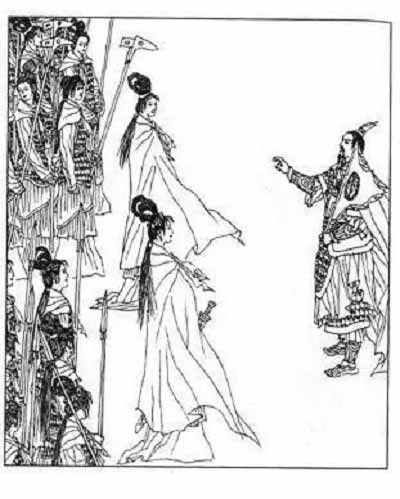
But the maids did not listen to the orders, laughed loudly, and the formation was in chaos. Sun Wu summoned the military officials and killed the two captains according to military law. When King Wu saw that Sun Wu wanted to kill his concubine, he immediately sent someone to tell her: I already know that the general can use troops. Without these two beauties to wait on me, my meal would be tasteless. Ask the general to pardon them. Sun Wu said mercilessly: “Since I have been ordered to be a general, I will not accept your orders as a general in the army.” Sun Wu insisted on killing the two captains.
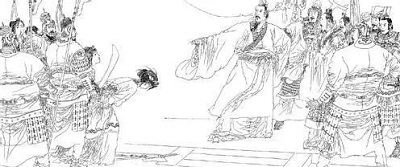
When Sun Wu beat the drum again and gave orders, all the palace maids moved forward, backward, left and right, knelt, climbed and rolled, all in line with the rules and in a very neat formation. Helu lost favored concubines and felt unhappy.When Sun Wu again beat the drum to issue orders, the courtesans before and after the left and right, in and out, kneeling, crawling and rolling up, all in line with the rules, the formation is very neat. King Helu of Wu was unhappy to lose his favorite concubine. Sun Wu met with King Helu and said: “The rule of order, reward and punishment is clear, this is the common law of the military, the general rule for the generals to rule the army. You must be strict with your soldiers, only in this way will they listen to orders and fight battles in order to overcome the enemy and win.” After listening to Sun Wu’s explanation, King Helu of Wu’s anger dissipated and he paid Sun Wu as a general.
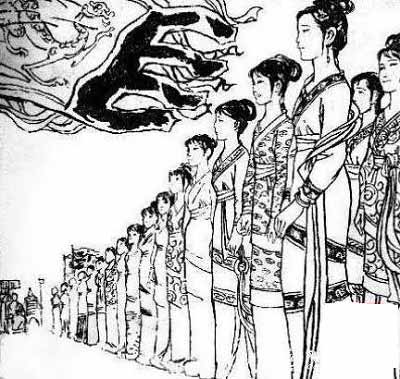
Through the practical training of palace maids, King Wu believed in Sun Tzu’s talents and appointed him as a general.
Defeated the Chu army
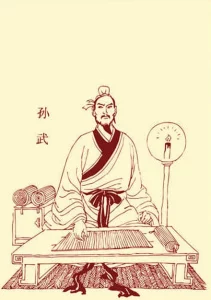
Under Sun Wu’s strict training, the military quality of the Wu army improved significantly.
In 512 B.C.(When Sun Tzu is 33 years old), just after Sun Wu became a general, he helped the king of Wu to destroy the two protectorates of Chu, Zhongwu and Xu. The king of Wu wanted to take advantage of the victory to attack Chu, but Sun Wu stopped him, believing that the army of Wu was exhausted and should not be fought again, so the king of Wu led his troops back to his country. Soon after, Wu Zixu proposed the strategy of “weakening Chu and misleading Chu”, and harassed Chu for six years, which made the Chu army think that Wu only dared to harass but did not dare to attack, so the army let down its guard.
In 506 B.C.(When Sun Tzu is 39 years old), Chu attacked Cai, a small state that had already submitted to Wu, giving Wu an excuse to invade Chu. Wu Zixu and Sun Wu commanded the well-trained 30,000 elite soldiers to travel up the Huai River on war ships, heading straight to Cai’s engagement with Chu. Seeing the ferocity of the Wu army, the Chu army had to give up the siege of Cai, shrink their troops, mobilize their main force, and use the Han River as a boundary to intensify their defense against the attack of the Wu army. Unexpectedly, Sun Wu suddenly changed his route along the Huai River, gave up his warships and attacked by land, plunging into the depths of Chu. Wu Zixu asked Sun Wu, “The Wu army is accustomed to water and good at water warfare, why did they change to march by land?”Sun Wu told him: “Speed is the most important thing in fighting with troops. You should take a route that others don’t expect in order to catch them by surprise. If you sail against the current, your speed will be slow. The Chu army will definitely take the opportunity to strengthen its defenses, and it will be difficult to defeat the enemy.” Wu Zixu nodded in agreement. In this way, Sun Wu selected 3,500 strong and agile soldiers from 30,000 elite soldiers for the front line. Wearing strong armor and holding sharp weapons, they defeated the Chu army one after another. On November 28 of the lunar calendar, the capital of Chu was invaded, and the king of Chu fled in panic with his sister. Sun Wu attacked Chu’s 200,000 army with an army of 30,000 and won a complete victory, creating a glorious battle example of defeating a large number with a small number.
After the Wu-Chu war officially started, Sun Tzu won five games in a row and captured the capital of Chu in just ten days! Ten days is really a very short time concept for ancient wars. Every battle that took place in these ten days was a blitzkrieg. As the saying goes: Speed is the soldier’s asset.
Assisted Wu State in fighting for hegemony
Sun Wu planned to conquer the state of Yue while helping to break Chu in the west. In 496 B.C., when the king of Wu heard that the king of Yue, Yun Chang, had died, the new king of Yue, Gou Jian, was young and weak, and Yue was not stable at home, he thought that the opportunity could not be lost, and the time would not come again, so he did not listen to Sun Wu and others, and did not wait for the preparations to be made, and then hastily sent out his troops to try to defeat the state of Yue. Unexpectedly, Gou Jian reorganized his troops and took the initiative to meet the enemy, and the two armies met at the border of Wu and Yue. In a clever trick, Gou Jian sent the condemned prisoners to march out first, lined up in three rows, put their swords on their necks, and cut themselves in front of the battlefield after making a presentation one by one.The soldiers of Wu State did not know that they were criminals, so they were confused. The Vietnamese army took the opportunity to charge, but the Wu army retreated hastily and died of serious injuries.
After the death of King Helu of Wu, the crown prince Fucha succeeded to the throne. Sun Wu and Wu Zixu reorganized their military equipment to assist Fucha in completing the great cause of revenge and avenging humiliation.
In the spring of 494 BC(When Sun Tzu is 51 years old), Gou Jian mobilized his army to march towards the Kingdom of Wu from the water. Fu Chai led 100,000 elite troops to fight. Under the planning of Sun Wu and Wu Zixu, the Wu army deployed many deceitful troops at night, divided into two wings, holding torches high. In the dark night, the flames formed a continuum and moved quickly towards the Vietnamese army’s position. The sound of killing was loud and the Vietnamese army was terrified and their morale was shaken. The Wu army took advantage of the momentum to launch a general attack and defeated the Vietnamese army. Gou Jian was pursued by the Wu army and ran away with 5,000 soldiers. He went to a small town on Kuaiji Mountain to resist. Due to the siege of the Wu army, Gou Jian had to humiliate Wu and sue for peace. Fu Chai ignored Wu Zixu’s dissuasion and agreed to Gou Jian’s peace request.
After the Wu State’s hegemony campaign was victorious in the southern region, it attacked the northern Central Plains region. In 485 BC, Fucha united with the Lu State and defeated the Qi army. In 482 BC, Fu Chai led tens of thousands of elite troops northward by water to Huangchi, where he made an alliance with the princes of Jin, Lu and other princes. At this alliance meeting, King Wu Fu Chai used strong military power as the backing to win the hegemonic position. Although Sun Wu did not directly participate in the victory over Qi and the struggle with Jin for hegemony, Sun Wu had carefully trained his army and formulated military strategies before, and made an indelible contribution to Fu Chai’s establishment of hegemony.
After helping Wu defeat Chu State, Sun Tzu helped Wu defeat Yue State. Relying on its strong military power, Wu finally gained the status of overlord.
Sun Tzu’s later life
As Wu’s hegemony grew, King Wu Fu Chai gradually became self-righteous and did not accept honest advice. Wu Zixu believed that if Gou Jian was forced to seek peace, he would definitely find a way to take revenge in the future. Therefore, the Yue Kingdom must be completely destroyed, and the traitors must not be tolerated to leave future troubles. But Fu Chai listened to the treacherous officials and not only ignored Wu Zixu’s bitter remonstrances, but also made excuses to force him to commit suicide. He even ordered people to put Wu Zixu’s body in a leather bag and throw it into the river without giving him a burial. Sun Wu was very chilled by the tragic death of Wu Zixu. At this time, he also knew that he could no longer carry out his lofty ambitions in Wu. So Sun Tzu quietly retired to the mountains, and based on his experience in training troops and commanding operations, he revised 13 chapters of his art of war to make it more perfect.
The fall of Chu:Things went as Wu Zixu expected. After the Yue King Gou Jian humiliated himself and sued for peace, he decided to take revenge. In 482 BC, the Vietnamese army took advantage of the main force of the Wu army to gather in Huangchi to form an alliance with the Central Plains princes. When Wu’s domestic troops were empty, they launched an attack on Wu and invaded the capital of Wu. Wu State was in trouble and collapsed. The decline continued until 473 BC, when the Wu State was officially destroyed. Fu Chai committed suicide due to shame and hatred.
Soon after Wu Zixu was killed, Sun Wu may have died due to worries about the country and the people and depression. His death year should be around 470 BC. From his retirement to the end of his life, Sun Wu never left the state of Wu. After his death, he was buried on the outskirts of the capital of Wu. There are also historical records that he was killed. Because he and Wu Zixu went to remonstrate with him, he angered King Wu Fu Cha and was brutally killed. Or because he was a good friend of Wu Zixu, he was angered and killed by King Wu Fu Chai.
After the struggle for hegemony, the king of Wu became arrogant and followed the advice of his treacherous officials to kill Wu Zixu. Sun Tzu also retired to the mountains and forests to revise Sun Tzu’s art of war. He died in 470 BC at the age of 75.
Memorialization of Sun Tzu by later generations
Sun Wu’s cemetery is located in Yuanhe Town, Xiangcheng District, Suzhou City, where the historical records of Sun Wu’s tomb are located. Suzhou is Sun Wu’s second hometown and the place where he achieved success and fame, and Xiangcheng District is where Sun Wu retired to live in seclusion. According to the records and textual research of “Yue Jueshu”, “Huang Lan”, “Yu Di Ji Sheng”, “Tianxia Scenic Spots”, “Wumen Biaoyin” and “Wu County Chronicles”, Sun Wu’s tomb is located in Xiangcheng District. It has also been recognized by academic experts at home and abroad and descendants of Sun Wu. In May 2005, the Xiangcheng District People’s Government built Sun Wu’s cemetery for future generations to pay their respects and make pilgrimages.
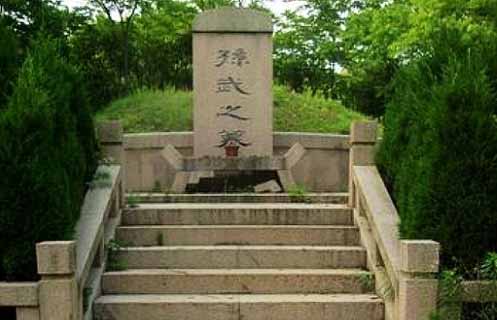
Summarize
Through this article, you have gained an overview of SUN TZU’s life.
In addition to his illustrious military exploits, Sun Wu’s life was also more important because he left many precious chapters on military affairs and politics to future generations, among which the “Art of War” that has been handed down is the most famous. These short 13 articles of 5,000 words embody Sun Wu’s complete military ideological system.
Sun Wu’s military thought has simple materialism and dialectical views. He emphasized that the outcome of a war does not depend on ghosts and gods, but is related to factors such as political clarity, economic development, diplomatic efforts, military strength, and natural conditions. Predicting the outcome of a war is mainly to analyze the above conditions, which reflects His simple materialistic views.
Sun Wu not only believed that the world exists objectively, but also believed that things in the world are constantly moving and changing. He emphasized that in war, conditions should be actively created to give full play to people’s subjective initiative, so as to promote the transformation of opposites in a direction beneficial to oneself. It shows that Sun Wu has mastered the vivid dialectics.
It is because Sun Wu summarized and concluded an unusually rich and multifaceted philosophical reasoning in the specific science of military science that he established his position in the late Spring and Autumn period in the world of thought side by side with Confucius and Lao Tzu, and was known as the three bright stars in the sky above the world of thought at the end of the Spring and Autumn period.
When did Sun Tzu live?
Sun Wu, 545-470 BC (approximately 2,500 years ago), was a native of Qi during the Spring and Autumn Period. He was honored by later generations as Sun Tzu, , the Sage of War, the master of a hundred generations of military strategists, and the originator of Eastern military science. Specifically, it is the late Spring and Autumn Period in China.
When did sun tzu die?
Sun Tzu’s death was around 470 BC, and he died around 75 years old.
When was The Art of War written?
It is generally believed that “The Art of War” was written between 515 BC and 512 BC. The book has thirteen chapters. It was a gift given by Sun Wu to the King of Wu when they first met. It took Sun Tzu three years to write The Art of War.
Extended Reading
Learn all about Sun Tzu and The Art of War in one article
The Art of War Summary by Chapter
The Art of War PDF Free Download
What is the best version of The Art of War?-Comparison of 10 versions